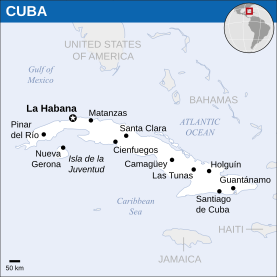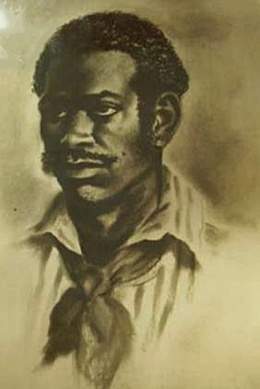Aponte conspiracy facts for kids
Quick facts for kids Cuban slaves rebellion |
|||||||
|---|---|---|---|---|---|---|---|
| Part of Spanish American wars of independence | |||||||
 |
|||||||
|
|||||||
| Belligerents | |||||||
| Cuban rebels | |||||||
| Commanders and leaders | |||||||
| José Antonio Aponte Manuel de Zequeira Francisco de Arango José Agustín Caballero José Núñez de Cáceres |
|||||||
The Aponte conspiracy (also known as the Aponte rebellion) was a major slave rebellion in Cuba. It happened in 1812. This rebellion is named after its main leader, José Antonio Aponte.
Why did the Aponte Conspiracy happen?
At the start of the 1800s, many enslaved people were brought to Cuba. This was because Cuba wanted to produce a lot of sugar, like Haiti used to. Because of this increase in slavery, many people wanted to end it. They started to plan ways to gain freedom.
One important attempt to end slavery happened in 1795. This was in a place called Bayamo. A freedman named Nicolás Morales led this effort. A freedman was a person who used to be enslaved but was now free. When his plans were found out, he had to run away and hide.
What was the Aponte Conspiracy?
In 1808, Napoleon invaded Spain. This event caused a lot of changes and new ideas. People in Cuba, especially those who wanted to end slavery, felt it was a good time to act.
Then, in 1811, a new plan for freedom started in Havana. It was led by José Antonio Aponte. He was a free Black carpenter and artist. His ideas and plans spread across many parts of Cuba. These areas included Sancti Spíritus, Trinidad, Camagüey, Bayamo, Holguín, and Santiago.
A brave man named Hilario Herrera helped connect the groups in western Cuba with those in the east. He was a mulatto from the Dominican Republic. He strongly believed that slavery should end. He was also very good at organizing secret groups.
On March 11, 1812, the plans became known in Camagüey. Soon after, people in Bayamo reported that a secret group existed in Holguín. The authorities started an investigation. More than 50 people were arrested. After a trial, the local leader in Holguín was punished severely. His name was Juan Nepomuceo, and he was from Congo. His friends, Federico, Antonio, Miguel, and Manuel, also faced serious consequences.
See also
 In Spanish: Conspiración de Aponte para niños
In Spanish: Conspiración de Aponte para niños
 | Claudette Colvin |
 | Myrlie Evers-Williams |
 | Alberta Odell Jones |


